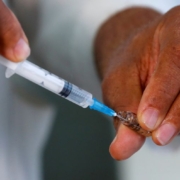Moderna Inc. plans to develop and begin testing vaccines targeting 15 of the world’s most worrisome pathogens by 2025 and will permanently waive the company’s COVID-19 vaccine patents for shots intended for certain low-income and middle-income countries.
Healthcare disruptions linked to the coronavirus pandemic helped malaria kill 69,000 more people in 2020 than the previous year, but a worst-case scenario was averted, the World Health Organization said on December 6.
The World Health Organization (WHO) said on Oct. 6 the only approved vaccine against malaria should be widely given to African children, potentially marking a major advance against a disease that kills hundreds of thousands of people annually.
An experimental monoclonal antibody developed at the U.S. National Institutes of Health (NIH) prevented malaria for up to nine months in volunteers exposed to the disease-causing parasite in a small trial, researchers reported on Aug. 11 in the New England Journal of Medicine.
BioNTech SE on July 26 announced the launch of the company’s Malaria project, which aims to develop a well-tolerated and highly effective Malaria vaccine and implement sustainable vaccine supply solutions on the African continent.
The same group at the University of Oxford and the Jenner Institute that developed the AstraZeneca-Oxford Covid-19 vaccine reported that their investigational malaria vaccine, R21/Matrix-M, demonstrated 77 percent efficacy in children over 12 months of follow-up.
A USA Today report found that from January through May 2020, 28 generic drugs in 405 dosages made the U.S. Food and Drug Administration’s list of drugs in shortage.
A lot of attention shifted to the malaria drug hydroxychloroquine for treatment of COVID-19, the disease caused by the novel coronavirus.
Researchers with the Pasteur Institute and CNRS (French National Center for Scientific Research) in France recently identified molecules that can inhibit DNA methylation and kill even the most resistant of the malaria parasites, Plasmodium falciparum.
The advent of increasingly more mainstream and affordable genetic testing enables powerful genetic research – but that power is directly associated with the strength and diversity of the database of genetic information available.







